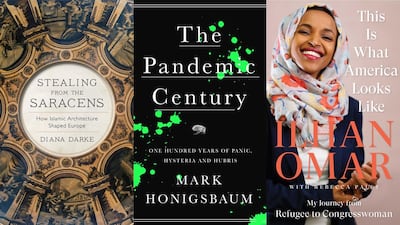When Hurst, a specialist publishing house based in London, was approached in 2016 about a book on the history of pandemics, it seemed like a reasonable acquisition.
The book, The Pandemic Century, by Mark Honigsbaum, was one of the hundred or so works published by the non-fiction publisher last year.
It charts the outbreaks of infectious diseases that incited panic and dominated news coverage throughout the world during the 20th century, beginning with the 1918 Spanish ‘flu pandemic.
The publication of the book a matter of months before the onset of the Covid-19 pandemic was “morosely timely”, Hurst’s managing director Michael Dwyer said.
“It was a very good book,” Dwyer explained, “and it's turned out to be one of the leading books on explaining the antecedents of this crisis now.”

The Pandemic Century was one of the first works from Hurst's recent publications and backlist that it is offering to readers through a somewhat unique subscription service to reach its readers directly during the pandemic.
The impact of the coronavirus outbreak on the publishing business across the world merely expedited plans that Dwyer had in the pipeline to launch the subscription service in the guise of the “Friends of Hurst” scheme.
"It's something we've been thinking of doing in the past for much of 2019 and the onset of Covid certainly quickened the pulse in terms of moving on that," he told The National.
The pandemic has forced rapid change in virtually every aspect of life and publishing has been no exception. There was also a distinct paradox that demand for books increased during lockdown, but the means of printing and delivering them were put in a stranglehold, Dwyer said.
In April and May, book shops in the UK and the United States were closed in nationwide lockdowns aimed at curbing the spread of the coronavirus. Hurst’s American distributor, Oxford University Press, was forced to closed its operations in North Carolina on the orders of the state government.

The online retail giant Amazon simultaneously de-prioritised deliveries of books as being what it deemed to be non-essential goods.
“And that meant we didn't get any orders from Amazon, essentially for about 10 weeks, I think, and they are a significant part of our sales and turnover,” Dwyer said.
“That's what made us think, well, we should be doing a lot more to push people to buy directly from us, to buy from our website, to connect with people,” he added.
The Friends of Hurst initiative is a scheme to connect the publishing house straight to its customers. Similar subscription models have been used by other publishers.
Through a monthly or annual subscription, readers have access to one book a month or every quarter from Hurst’s recently published and backlist of books. Each title sent to the subscriber is tailored to that reader’s preference but chosen by the publisher.

Among those currently making their way on to the curated list are the recently released Stealing from the Saracens by Diana Darke and US congresswoman Ilhan Omar's This is What America Looks Like.
Darke’s book, released in August outlines the often-forgotten interplay between Europe and the Islamic world through architecture and the debt that the West owes to the techniques and styles pioneered in the Arab world.
Omar’s memoir tells her story from her childhood in Somalia’s Mogadishu and in a Kenyan refugee camp before she arrived in the United States. It also recounts her election to the US House of Representatives where she was one of the first two Muslim women to serve in congress.
Hurst was founded in 1969 with a publishing focus on non-fiction books about Africa and Eastern Europe that reflected the interests of Dwyer’s late business partner Christopher Hurst. The publishing house has expanded into Islamic and Middle Eastern Studies, South Asian Studies and War and International Relations but has always favoured topics close to the hearts of its editorial staff.
Identifying books that are interesting will always lie at the centre of the publishing house’s philosophy but more difficult changes are to come in the wake of the pandemic.
“A lot of smaller independent book shops will probably go out of business,” Dwyer said. “Because of the cash-flow problems they experienced, they won't be coming back.
“There's the idea of bookshops working together, smaller book shops. And they are floating shared buying patterns, shared warehouses to try to compete with their bigger foes.
“But I think all publishers now will realise that we have to be much more alert to responding to our customers and being able to supply them directly.”
Dwyer has said that Hurst’s reputation as a specialist publisher will be to its advantage as the industry continues to change and publishers have to stand on their own.
"The problem in all this is that most book buyers do not recommend, do not remember or recall the brand or the name of the publisher,” he said.
“I think it's easier for publishers like Hurst to do that because we follow certain niches."

